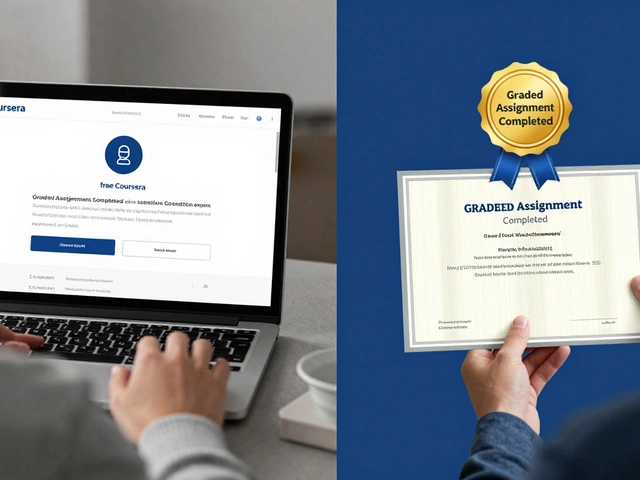In an age where education costs can easily rival the price of a new car, the allure of free college courses is undeniable. With platforms like Coursera, edX, and Khan Academy opening doors to Ivy League classrooms, how does one determine if these opportunities are worth the investment of time? The answer, while elusive, hinges on various factors from course credibility to personal discipline.
As we dive into this complex topic, we'll explore how these free offerings stack up against traditional learning and discover the hidden gems that may propel you forward in your personal and professional life. Get ready to embark on an enlightening journey through the landscape of free online education!
- The Rise of Free Learning Platforms
- Evaluating Course Credibility
- Balancing Flexibility and Discipline
- The Impact on Career Opportunities
- Maximizing the Benefits of Free Courses
- Understanding the Limitations and Challenges
The Rise of Free Learning Platforms
The dawn of the digital revolution has heralded a new era in education, providing unprecedented opportunities for learners worldwide. With the advent and proliferation of free college courses online, gaining access to quality education has never been easier. Major platforms like Coursera, edX, and Khan Academy have emerged as pioneers in this realm, each carving unique niches in the educational landscape.
Breaking Barriers with Technology
At the heart of these online platforms lies technology that bridges the gap between learners and institutions previously restricted by geographic and financial boundaries. Coursera, for instance, partners with top universities such as Stanford and Yale to offer courses spanning various disciplines. This democratization of education means learners from anywhere can enroll in classes once available only to those on prestigious campuses.
edX follows a similar model but emphasizes open-source technology, allowing educators to modify and use their platform for diverse educational purposes. This flexibility has helped expand its reach and influence, making quality education attainable globally.
Diversification of Offerings
Over the years, these platforms have significantly diversified their offerings. From career-specific certificates to comprehensive degree programs, e-learning is no longer limited to generic courses. They cater to varied interests and professional ambitions, ensuring broader engagement with learners' unique needs and goals.
Why Are They Free?
One might wonder how such invaluable resources can be offered at no cost. These platforms operate on various business models that allow free access to course materials while charging for certifications, verified credentials, or additional services. Their sustaining partnerships with universities, corporations, and governments further bolster their ability to keep courses free for learners worldwide.
The Numbers Game
Statistics underscore the profound impact these platforms have had on online courses adoption. For instance, by 2023, Coursera had over 90 million registered users, while edX was not far behind with approximately 35 million. The continual rise in these numbers is a testament to the value learners derive from these platforms.
| Platform | Registered Users (2023) |
|---|---|
| Coursera | 90 million |
| edX | 35 million |
| Khan Academy | 20 million |
These platforms continue to reshape how we view education. They layer innovation over tradition, providing opportunities for lifelong learning that adjusts to individual lifestyles—proving that high-quality education is not only for the privileged but for anyone eager to learn.
Evaluating Course Credibility
In the ever-expanding realm of free education, one significant challenge that learners face is determining the credibility of a course. With a plethora of options available, how do we discern which courses deliver genuine value and which fall short? Let's delve into the factors that exhibit a course’s trustworthiness and integrity.
Accredited Institutions and Partnerships
Many reputable online platforms, like Coursera and edX, partner with renowned universities to offer courses. When a course is delivered in collaboration with an accredited institution, it often enhances its credibility. Look for courses associated with well-known universities or colleges, as these affiliations usually guarantee high-quality content and a level of academic rigor.
Instructor Expertise
The expertise of course instructors plays a crucial role in course credibility. Research the instructors to understand their background, qualifications, and affiliations. Courses led by professionals or academics with significant experience in their field are generally more reliable. Their insights and guidance can significantly impact your learning experience.
Course Reviews and Feedback
Just as we read product reviews before making a purchase, it's wise to consider course reviews. Learner feedback on platforms can provide insights into the course’s practicality, quality, and engagement level. Look for courses with positive testimonials and high completion rates, as these are strong indicators of a course's effectiveness.
Engagement Metrics
Another useful metric is the course's enrollment and completion rates. High numbers can indicate a course's popularity and the satisfaction of previous students. Some platforms might even publicize these statistics to showcase their transparency.
Content Validity and Updates
In the rapidly evolving digital landscape, information becomes outdated quickly. Ensure that the courses offer up-to-date content reflective of current trends and data. Courses that regularly update their material are more likely to maintain their relevance and usefulness.
The Role of Certifications
Although the core appeal is cost-free learning, certification can add a layer of credibility. When a course includes a certified option—albeit for a fee—it signifies a level of standardization and can provide tangible value in a professional setting. However, ensure that the certificate is recognized and valued in your desired field.
By weighing these factors carefully, you can navigate the expansive world of online courses and select programs that truly add value to your educational journey, ensuring that your investment in time and effort pays off.
Balancing Flexibility and Discipline
The appeal of online courses often lies in their flexibility. Imagine learning at your own pace, on your own schedule, without the constraints of timetables or physical classrooms. This freedom is a double-edged sword, however, as it also requires a fair amount of discipline to truly thrive. For many, balancing these two seemingly opposing forces can make or break their educational journey.
Embracing Flexibility
Free college courses offer unparalleled flexibility. Whether you're a working professional trying to upskill in the evenings, or a stay-at-home parent squeezing in lessons during nap times, these courses adapt to your life. According to a report by Class Central, a leading aggregator of online courses, the majority of users appreciate this flexibility as it allows them to weave learning into their daily routine without major disruptions.
This flexibility can also lead to innovative learning styles. Some learners may binge on course material over a weekend, while others prefer to digest smaller chunks over longer periods. Whatever your preference, free courses accommodate it.
Instilling Discipline
Despite the liberating nature of free e-learning options, the absence of structured classroom environments can make staying on track challenging. The key lies in disciplined self-management. Here are a few tips to cultivate that discipline:
- Set clear goals: Define what you wish to achieve with the course to maintain motivation.
- Create a schedule: Allocate specific time blocks to focus on coursework each week.
- Minimize distractions: Designate a quiet space for studying away from the usual hustle and bustle of your daily life.
- Track your progress: Regularly review your achievements and adjust your pace accordingly.
By managing your time and environment effectively, you can harness the flexibility of free education without falling prey to procrastination.
Case Study: Success Through Balance
Consider the story of James, a 30-year-old marketing manager who wanted to dive into data science. Unable to commit to a full-time study schedule due to work commitments, he turned to free online courses. By establishing a rigorous routine, allotting late-night hours for study, and using performance trackers, James completed a comprehensive data analysis course in three months, gaining a valuable edge in his career.
James's experience illustrates how a strategic blend of flexibility and discipline can transform an aspirational learning experience into a tangible advantage.
Conclusion
Balancing the freedom to learn whenever, wherever, with the discipline needed to complete courses, is pivotal in extracting real value from these free college courses. While the pathways are self-directed, the rewards for disciplined learners can be immeasurable, forming a foundation for lifelong learning and personal growth.

The Impact on Career Opportunities
As the digital landscape shifts, the role of free online courses in influencing career paths grows more significant. But can a no-cost course truly measure up against traditional, costly educational pathways when it comes to career advancement? Let's dive into the sea of opportunities these courses can unlock, and the realities learners might face.
Skills and Specializations
For many seeking to enhance or pivot their careers, acquiring specific skills can be more valuable than a traditional degree. Platforms offering free college courses often focus on developing practical skills through specialization tracks. For example, taking a coding class on platforms like Coursera or edX can swiftly transition someone from a novice to job-ready, especially in tech-driven industries where skills speak louder than credentials.
Networking and Professional Growth
While traditional educational settings naturally foster networking through classroom interactions, online courses are catching up. Learners often participate in forums and discussion groups, which can lead to valuable connections and collaborations. These interactions may not replace traditional networking methods but certainly amplify options for growing a professional circle.
Employer Recognition
The corporate world is gradually starting to recognize and value the dedication of self-taught candidates. Companies like Google and IBM have begun to partner with online learning platforms to create tailored courses, acknowledging the importance of these skills in potential employees. However, learners should be discerning, as not all free courses carry the same weight in the eyes of employers.
Statistical Insight
| Opportunity Type | Percentage of Employers Recognizing |
|---|---|
| Relevant Job Skills | 81% |
| Industry Approved Certifications | 76% |
Certain fields, especially those involving technology or data analysis, have shown higher acceptance rates of credentials from online courses. As online education continues to establish its place, certifications and completion badges from reputable platforms are becoming an attractive addition to resumes.
Conclusion: A Strategic Supplement
While free e-learning courses can significantly impact career opportunities, they are most effective when viewed as supplements rather than replacements for formal education. By aligning course selection with career goals and emphasizing recognized certifications, learners can strategically enhance their marketability. As the value of traditional credentials rebalances with evolving educational paradigms, a strategic approach to utilizing these resources could indeed open doors that were once barred by hefty tuition fees.
Maximizing the Benefits of Free Courses
Free college courses are more accessible than ever, thanks to the digital revolution. Yet, like all great opportunities, they come with their own set of challenges and potential. To truly leverage these courses, a strategic approach is necessary.
Setting Clear Learning Goals
Before diving into a plethora of online courses, pinpoint what you aim to achieve. Are you looking to upskill, transition into a new career, or simply satisfy your curiosity? Defined goals will help in selecting courses that align with your aspirations and ensuring that the time invested translates into tangible outcomes.
Curating a Structured Learning Path
While the freedom to choose any course at any time is tempting, having a structured path can prevent the all-too-common scenario of starting multiple courses and finishing none. Platforms like Coursera and edX often offer curated tracks in specific subjects, providing a more cohesive learning experience and ensuring a steady progression from basics to advanced concepts.
Engaging with the Community
One of the underrated aspects of e-learning is the communal interaction it offers. Engage with classmates globally through forums and group discussions. Not only does this enhance understanding, but it also helps in building a network with individuals sharing similar interests. This can be invaluable for future career opportunities.
Utilizing Additional Resources
- Attend live sessions or webinars if available. These often feature experts who can provide deeper insights into the subject matter.
- Use supplementary materials provided by the platforms, such as articles, videos, and recommended readings.
- Tap into third-party resources like discussion boards, study groups, and even related social media pages to supplement learning.
Reviewing and Applying Knowledge
Perhaps the most crucial step is the application of knowledge. Whether it's a free education module on software programming or an introduction to philosophy, practical application deepens understanding. Work on projects, seek internships, or engage in voluntary activities to not just learn but also apply skills.
A 2023 study from the National Bureau of Economic Research highlights that individuals who apply new skills immediately after course completion have a significantly higher retention rate. Thus, hands-on experience plays a pivotal role in maximizing the benefit from these courses.
Embrace the dynamic world of e-learning by optimizing your approach to free college offerings. With determination, the possibilities are as limitless as your aspiration to learn. Remember, each course completed is a stepping stone to greater knowledge and perhaps, the career leap you’ve been envisioning.
Understanding the Limitations and Challenges
While free college courses offer an incredible opportunity to access knowledge, they come with certain caveats that learners should be aware of. One primary limitation is the lack of formal accreditation. Many online courses, though taught by prestigious universities, do not provide credits that can be transferred to degree-granting institutions. This means that despite gaining knowledge, you may not be able to apply these courses towards a formal degree.
Quality and Depth of Content
Another significant challenge is the variation in the quality and depth of the content. While some courses are meticulously crafted, offering robust study materials and interactive assessments, others might lack comprehensiveness or fail to keep pace with advancements in the subject. It's not uncommon for popular platforms to have courses that are outdated or ridden with information gaps. Therefore, careful evaluation of course syllabi, reviews, and instructors' backgrounds is crucial before enrollment.
Self-Discipline: The Deciding Factor
The nature of e-learning demands a high degree of self-discipline and motivation. Unlike traditional classroom environments, where scheduled classes and peer interaction create a structured routine, online learners must self-regulate to adhere to their study plans. This can be daunting, especially for those who thrive on external pressure and guidance. Without proactive engagement and dedicated time management, the chances of course completion can dwindle significantly.
Statistics on Completion Rates
Completion rates for free online courses often hover around a meager 15% to 20%, according to a study conducted by Harvard University in 2022. Factors such as lack of engagement, inadequate support, and the absence of financial stakes contribute to higher dropout rates. These statistics highlight the importance of self-commitment in successfully navigating free educational opportunities.
Balancing Expectations and Outcomes
It's also vital to manage expectations regarding the outcomes of free courses. While they can add immense value to personal knowledge and skill enhancement, relying solely on them for career advancement might not always yield the desired results. Certifications from platforms may bolster a resume but are often not a substitute for required credentials in specialized fields.
In conclusion, navigating the landscape of free college courses requires an aware approach, balancing the allure of cost-free education with a realistic understanding of its limitations and challenges. By being informed and prepared, learners can tailor their educational pursuits to align with their personal and professional goals, maximizing benefits while mitigating obstacles.




